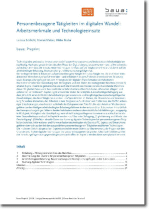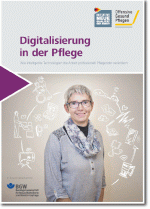Work on and with people - how is digitalisation changing dialogue-based, interactive tasks?
Nursing, teaching, therapy, counselling – the digitalisation of the world of work is also affecting people-oriented tasks. It remains to be seen which technologies can be of use here and how they will change the work processes.
People-oriented tasks have the objective of bringing about changes to and with people. The subject matter of work is a person or a group of people – with their individual expectations, requirements and needs. Therefore, the results of people-oriented tasks are not generally objective: nothing tangible is produced; on the contrary, a personal service is provided.
A large portion of the employees in Germany work in occupations that mainly - although not exclusively - involve people-oriented tasks. The necessary qualifications in this field differ considerably: it includes training and assistance work (such as everyday support or care assistance), as well as training occupations (such as hairdressing, teaching assistants), and occupations that require a university degree (such as teaching professionals, medical specialists).
We can be certain that digitalisation will not pass these occupations by either, leading to some noticeable changes in the respective tasks. The questions of how people-oriented tasks might be made human-centred in the future, what needs to be taken into account with the introduction of digital technologies in terms of occupational safety and health, as well as the opportunities and risks for occupational safety and health associated with them are addressed in the area of "people-oriented tasks". The objective is to gain a more accurate picture of the frequency of people-oriented tasks, their degree of digitalisation or potential for digitalisation, as well as the associated working conditions and requirements. The overriding goal is to develop task-specific guiding principles for the digital world of work.
Approach
The research in this area consists of the following steps:
Step 1
- Definition of people-oriented tasks in terms of their type and scope
- Ascertaining and analysis of the level of knowledge for the human-centred design of people-oriented tasks in the digital world of work
- Identification of relevant groups of employed persons for the further work
Step 2
Per group: evaluation of whether digital technologies can improve the working conditions in this field
Step 3
Development of forward-looking guiding principles for people-oriented tasks based on the overriding criteria of human-centred work in the digital world of work
Step 4
Deriving further requirements surrounding the need for action and design from the overview of the previous steps, taking the work in the programme components "Monitoring the digital world of work" and "OSH systems in the digital world of work" into consideration


